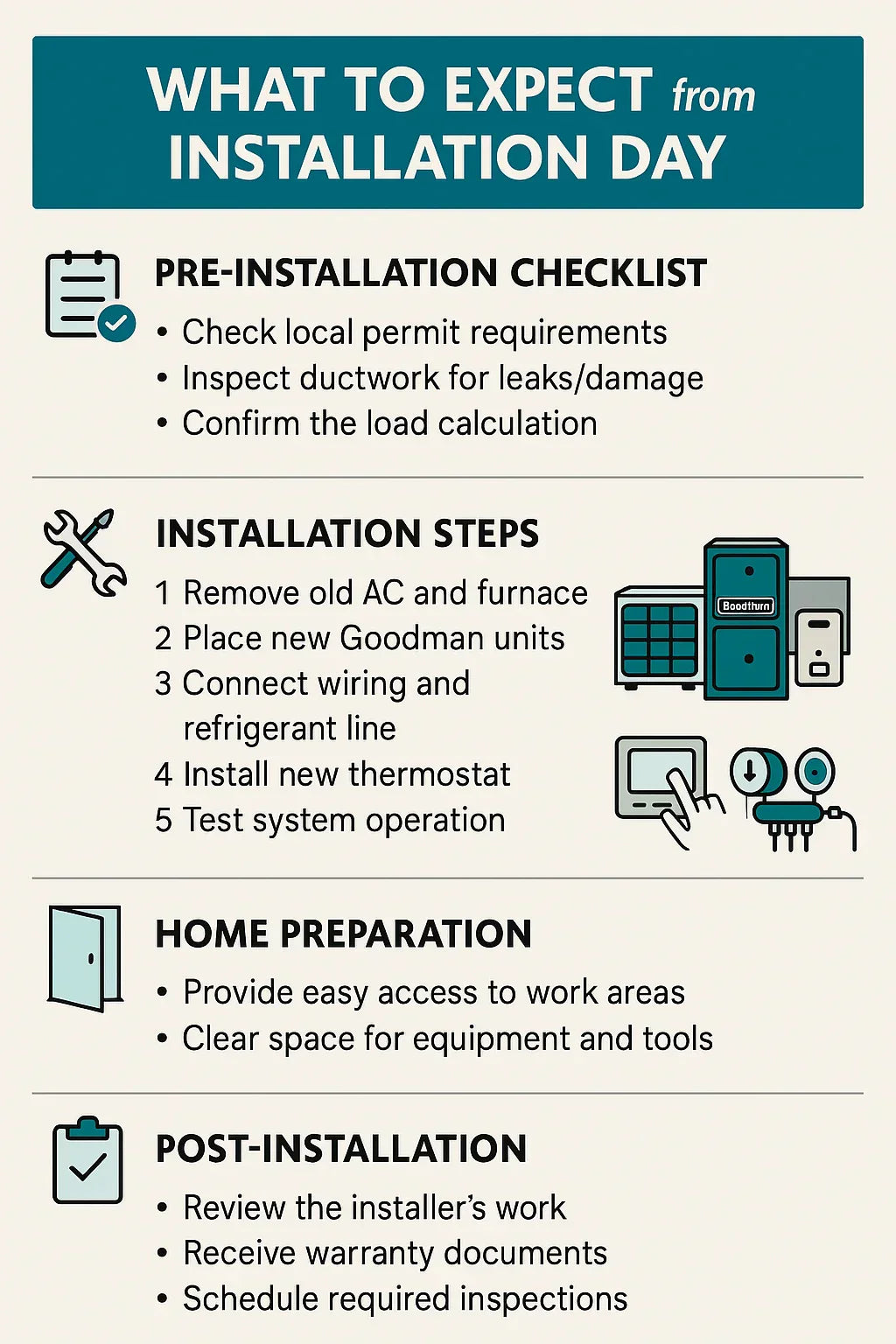🔀 1. Pre-Installation Planning: What Happens Before They Arrive
📖 Permit & Paperwork
-
Most HVAC installs require a city or county permit.
-
Your contractor should handle this.
-
Ask if an inspection will follow.
📊 Load Calculations (Manual J)
-
A Manual J calculation sizes the system to your home’s heat loss/gain.
-
Ensures your 3-ton AC and 80,000 BTU furnace are correctly matched.
-
Red flag if the installer doesn't do one.
🛏️ Site Assessment
-
The contractor will inspect:
-
Existing ductwork
-
Power supply
-
Furnace closet, attic, or crawlspace
-
Refrigerant line path and line set diameter
-
🚧 2. Installation Day Timeline & Process
⏰ How Long Will It Take?
-
Full install: ~1–2 days depending on access, ductwork, and crew size.
-
Team: Usually 2–4 certified HVAC techs.
🔧 Step-by-Step Installation Breakdown
-
Remove old AC and furnace
-
Safely discharge refrigerant
-
Disconnect duct, gas, and electrical
-
-
Install new Goodman 80,000 BTU Furnace
-
Adjust platform or base
-
Connect gas line and flue (metal or PVC)
-
Install condensate drain if needed
-
-
Install vertical cased coil
-
Sits above furnace
-
Connects to AC line set
-
-
Mount outdoor 3-ton condenser
-
Use existing pad or pour new concrete
-
Level unit; allow 12–24" clearance for airflow
-
-
Run refrigerant lines (line set)
-
Must match coil/condenser specs
-
Pressure test, then vacuum down
-
-
Electrical & Thermostat hookup
-
Connect to disconnect box and breaker panel
-
Wire to thermostat (preferably a programmable or smart model)
-
-
Startup & Commissioning
-
Check airflow, refrigerant charge, and temperature split
-
Validate static pressure (use a manometer)
-
Confirm gas pressure for the furnace
-
-
Cleanup and Walkthrough
-
Review system operations with homeowner
-
Explain filter access and maintenance
-
Provide warranty registration info
-
🏡 3. What You Should Do to Prepare
🛋 Clear Access
-
Move furniture, rugs, storage near:
-
Furnace closet or attic hatch
-
Thermostat
-
Outdoor condenser pad
-
🐾 Pet Safety
-
Keep pets away from work zones
-
Noise and open doors can be stressful for animals
🪜 Parking and Entry
-
Leave driveway space for trucks
-
Confirm installers have access to the panel box and crawlspace
✅ 4. What a Good Install Looks Like
-
Matched indoor/outdoor components (e.g., TXV coil with 3-ton unit)
-
Mastic-sealed ductwork at joints (no duct tape)
-
Level condenser on stable base
-
Clean, insulated refrigerant lines
-
All wiring neatly strapped and labeled
-
Static pressure readings within spec (0.3–0.5 in. wc typical)
❌ 5. Red Flags to Watch For
-
No Manual J or airflow testing
-
Reusing incompatible line sets without cleaning or replacing
-
Gas leak or venting issues left unaddressed
-
No explanation of thermostat or maintenance schedule
🏢 6. Post-Installation Requirements
📚 Final Inspection (if required)
-
Usually scheduled within 1–2 weeks by the contractor
-
May include:
-
Electrical connections
-
Gas pressure check
-
Proper ventilation
-
📄 Warranty Registration
-
Goodman offers 10-year parts and lifetime heat exchanger warranties if registered within 60 days.
-
Do this on Goodman's Warranty Site
💡 Utility Rebates or Tax Credits
-
Ask about:
-
Local utility rebates for 15.2 SEER2+ systems
-
25C tax credits (up to $600 for qualifying AC/furnace installs)
-
🤝 7. Questions to Ask Your Installer
-
Did you perform a Manual J load calculation?
-
Did you check static pressure and refrigerant charge?
-
Where is the air filter located and how often should I replace it?
-
What should I do if the thermostat displays an error code?
-
Can you show me how to register the warranty?
-
When is the inspection scheduled?
📝 8. Verified Resources
🔹 Final Tip for Mark
“The best HVAC system in the world will underperform if it’s installed poorly. Be present, ask questions, and don’t settle for shortcuts.”
Your Goodman 3 Ton 15.2 SEER2 AC and 80,000 BTU furnace system is a long-term investment. A quality install ensures you get every bit of comfort, savings, and longevity it promises.
In the next topic we will know more about: Maintenance Guide — How to Keep Your Goodman System Running Efficiently Year-Round







